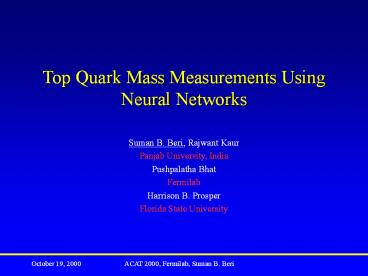Top Quark Mass Measurements Using Neural Networks - PowerPoint PPT Presentation
Title:
Top Quark Mass Measurements Using Neural Networks
Description:
Measuring the Top Mass. In Run II we expect about 100 times more data than was collected in Run I. ... Mean NN output vs Top Mass ... – PowerPoint PPT presentation
Number of Views:45
Avg rating:3.0/5.0
Title: Top Quark Mass Measurements Using Neural Networks
1
Top Quark Mass Measurements Using Neural Networks
- Suman B. Beri, Rajwant Kaur
- Panjab University, India
- Pushpalatha Bhat
- Fermilab
- Harrison B. Prosper
- Florida State University
2
Outline
- Introduction
- Neural Networks
- Event Simulation
- Preliminary Studies
- Summary
3
Introduction
- Run I,
- 1995, March 2 Discovery
- mt 176 17 GeV/c2 (CDF)
- mt 199 30 GeV/c2 (DØ)
- 1999, Combined Mass
- mt 174 5 GeV/c2 (CDF DØ)
- Run II, (2001)
- mt 174 ? GeV/c2
4
Why Measure The Top Mass?
Corrections to W and Z mass
According to the Standard Model quantum
corrections to the W and Z boson masses induce a
relationship
from which we can infer something about the Higgs
mass
5
Measuring the Top Mass
- In Run II we expect about 100 times more data
than was collected in Run I. - The main task is to reduce systematic errors so
that we can benefit from the reduction in
statistical errors - Goal to determine mt as accurately as possible by
making optimal use of information - using as many decay modes as possible
- using several methods to cross-check the results
- exploring different methods which may yield
smaller systematic errors.
6
Feed-Forward Neural Networks
x1
x2
x3
x4
Use non-linear transfer function (e.g., sigmoid)
7
Training Neural Networks
Training simply means minimizing the error
function
n(xi, w) network function xi feature vector
for pattern i, where i 1,N patterns w
weights dk desired output for pattern i, where
k 1,.. M classes
8
A Bit of Bayes!
P(k) Prior probability Pr(xk) Likelihood
(Probability to get x given that x belongs to
k) P(kx) Posterior probability (Probability
to belong to k given x)
9
Special Case Classification
If dk 0 for class k 1 (e.g.,
background) dk 1 for class k 2 (e.g.,
signal) Then
Reduces to
10
Neural Networks in Run I and II
- Run I
- Used by DØ to discriminate signal from background
- Used in the lepton jets channel for top quark
mass measurement - Run II
- Can they be used to measure masses?
- Test some ideas using the e-m channel
11
The e-m channel
12
Branching fractions
13
Characteristics of e-m Events
- Signature
- Two isolated, high pT leptons
- Significant missing transverse energy
- 2 jets from b quarks
- Branching fraction
- 2.4
14
Event Simulation
- Tools
- Pythia 6.143 to generate events
- SHW 2.3 to model detector (John Conway)
- MLPfit 1.4 to train networks
- Python interface to above tools
- Signal
- Top events (100 to 250 GeV in steps 10 GeV)
- Backgrounds
- Z tt- em
- WW em
15
Event Variables
End-point occurs at the top mass if b quark and
the lepton are correctly paired
- Variables
- x1 f(e,b1)
- x2 f(m,b2)
- x3 f(e,b2)
- x4 f(m,b1)
- where
16
Distributions Correct/Wrong Pairing
Parton-level (blue) distributions compared to
distributions at the reconstruction-level
(red). We see that these variables are
insensitive to jet energy scale uncertainties
and fragmentation Also, note the sharp
end-point when the b and lepton are correctly
paired.
17
Distributions Reconstruction Level
We have not yet devised a method to pair the
lepton and b quark with high probability. For
now we take all pairings of leptons and b quarks.
18
Combining Variables using NN
- Use NN to create a single mass-dependent variable
y from the variables x1 to x4 - Training
- 500 events/top mass (100 to 250 in steps of 10)
- Target output dk top quark mass
- 200 epochs
19
Neural Network Output Distributions
160 GeV 169 23
170 GeV 175 25
GeV
GeV
180 GeV 181 24
190 GeV 186 25
20
Mean NN output vs Top Mass
The distortions are caused by edge effects, that
is, restriction to a finite range. Need to deal
with this.
21
Some thoughts about how to proceed
- Let y be the NN output.
- Let P(ymt) denote the probability to get y given
the true top mass mt. - Use Bayes theorem to invert probability
- Use position of maxP(mty as top mass estimate
22
Summary
- The challenge in Run II will be to reduce
substantially the systematic uncertainties. - We are conducting a systematic study of neural
network based methods of mass measurement. - This is just the beginning.
- From our success in Run I we are hopeful that our
current efforts will be fruitful.































